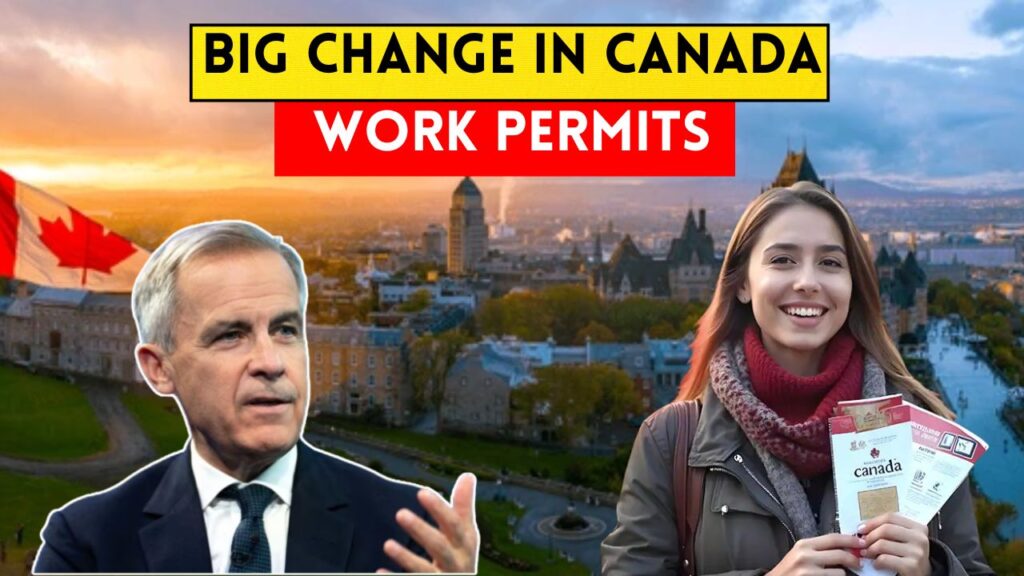Canada has announced new work permit extension regulations for 2025, introducing major changes for temporary and skilled foreign workers. These updates aim to support workforce stability and address labour shortages across multiple industries. The new rules redefine eligibility criteria, streamline renewal processes, and make it easier for existing foreign employees to continue working legally in Canada. For thousands of international professionals, this extension policy represents a vital opportunity to maintain their employment status and pursue permanent residency options within the country.

Updated Canada Work Permit Eligibility 2025
The latest Canada work permit extension framework focuses on simplifying renewal pathways for skilled professionals already in the workforce. Individuals under the Temporary Foreign Worker Program and International Mobility Program can now extend their permits without leaving the country. Applicants must show continued employment in eligible occupations and provide up-to-date proof of job offers or contracts. The government’s move reflects its commitment to retaining experienced talent and addressing labour shortages in key sectors like healthcare, manufacturing, and technology.
Skilled Foreign Workers Benefit from Streamlined Rules
The new 2025 policy brings significant relief for skilled foreign workers in Canada by reducing documentation delays and extending validity periods. Under the revised structure, professionals can apply for a two-year permit extension with simplified digital processing. This initiative allows foreign employees to maintain legal work status while their permanent residency applications are under review. The federal government aims to ensure smoother transitions for international employees and strengthen Canada’s competitive edge in the global talent market.
Temporary Workers’ Renewal and Transition Opportunities
Temporary employees holding expiring permits will benefit from the Canada work permit renewal initiative in 2025. Eligible candidates can extend their stay if they meet specific employment and compliance conditions. Workers must have a valid Labour Market Impact Assessment (LMIA) or an LMIA-exempt job offer. The new system enhances flexibility for employers and workers by ensuring continuity of employment and fair processing timelines. It also opens doors for those seeking permanent settlement through economic immigration pathways such as Express Entry.
Summary and Policy Impact
Overall, the 2025 work permit extension policy marks a progressive step toward a more inclusive and efficient immigration framework in Canada. It empowers temporary and skilled workers to continue contributing to the economy while pursuing long-term residency goals. Employers benefit from reduced turnover, and foreign nationals gain stability through streamlined renewals. These new measures highlight Canada’s ongoing commitment to fostering a diverse and sustainable workforce that supports both economic recovery and demographic balance.
| Category | Key Requirement | Permit Validity | Eligible Workers |
|---|---|---|---|
| Temporary Foreign Worker Program | Valid LMIA or offer | Up to 2 years | Skilled & Semi-skilled |
| International Mobility Program | LMIA-exempt job | 2 years | Professionals & Transfers |
| Post-Graduation Extension | Graduates of Canadian schools | 18–24 months | Former international students |
| Permanent Residency Transition | Ongoing PR application | Until PR decision | Existing permit holders |
| Sector Priority List | Healthcare, IT, trades | Up to 3 years | Designated occupations |
Frequently Asked Questions (FAQs)
1. Who qualifies for the 2025 Canada work permit extension?
Temporary and skilled workers with valid job offers qualify under the new policy.
2. How long can the new permit last?
The renewed permits can last up to two or three years depending on category.
3. Do applicants need to leave Canada to renew?
No, eligible applicants can renew their permits while staying in Canada.
4. Can permit holders apply for permanent residency?
Yes, they can apply for permanent residency through approved immigration programs.




